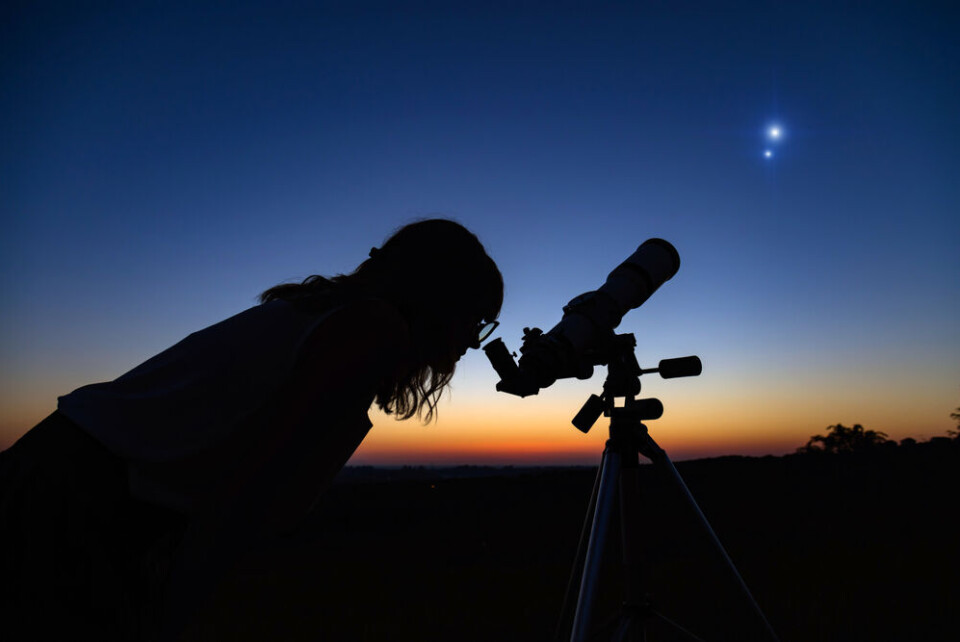-
Health and medicine: What's new in France in 2026
Including social security law and a potential new charge for foreign residents
-
Cars and driving: What's new in France in 2026
Including the new pollution tax on used cars, motorway toll changes and speed camera changes
-
More than a quarter of new car registrations in France are electric
EV sales hit new record in November 2025
Nuits des étoiles: stargazing events across France this weekend
There are 476 workshops and telescope sessions taking place in 335 French communes, enabling astronomy lovers to learn more about our universe

This weekend marks the 32nd edition of Les Nuits des étoiles, which begins tonight (August 5) and lasts until Sunday night (August 7).
The event is organised by the Association française d’astronomie (AFA) and features 476 special stargazing sessions in 335 communes around France.
Les Nuits des étoiles enables astronomy lovers to meet with scientists to learn about the skies above us through workshops and telescope observation sessions.
Using a telescope, it is possible to see Jupiter, Saturn and sometimes Uranus and Neptune, as well as the Moon and its craters, seas and mountains.
This year’s theme revolves around the idea of exploration, “of man’s return to the Moon and future quests to Mars”.
The AFA has created a map of all the different events taking place around the country.
For example, in Paris’ Parc Montsouris, the organisation will be setting up telescopes in the night of August 4-5 so that local people can stargaze for free.
Similarly, in Lyon, the AFA will provide telescopes from 21:00 on August 5 in Villeurbanne, which the public will be able to use for free.
Météo France forecasts largely clear nights over the whole weekend, so conditions should be ideal for stargazing
Before the Covid pandemic restricted the Nuits des étoiles activities in 2020 and 2021, some 190,000 people took part in 580 events across 380 communes in 2019.
While the majority of events take place in France, there are also sessions organised each year in countries including Belgium, Switzerland and Algeria.
The James Webb effect
The launch into orbit of the James Webb space telescope on December 25, 2021 – to replace the retiring Hubble telescope – has heightened global interest in space exploration, and may encourage more people to take part in Nuits des étoiles events this year.
At the beginning of July, the first photograph taken by James Webb was unveiled by US President Joe Biden, showing the deepest and sharpest infrared image of the universe ever taken.
It's here–the deepest, sharpest infrared view of the universe to date: Webb's First Deep Field.
— NASA (@NASA) July 11, 2022
Previewed by @POTUS on July 11, it shows galaxies once invisible to us. The full set of @NASAWebb's first full-color images & data will be revealed July 12: https://t.co/63zxpNDi4I pic.twitter.com/zAr7YoFZ8C
More recently, the telescope has captured images of the Cartwheel Galaxy – which is 500 million lightyears away from Earth – the Cosmic Cliffs of Carina Nebula and more.
What can I see in the night sky this August?
Les Nuits des étoiles fall in the best month of the year to stargaze in France, so even if you do not take part in any events this weekend, there will still be several opportunities to spot space spectacles in the sky above.
For example, the Perseids meteor shower should be visible until August 25, although its activity will peak on the night of August 12 this year.
This annual ‘shooting star’ event is caused when the Earth passes through the stream of debris left in the wake of Comet Swift-Tuttle, bringing pieces of matter crashing into the upper atmosphere at high speed and lighting up the night sky.
The Perseids are so named because the meteors appear to come from the Perseus constellation, which is located near one of the brightest star formations, Cassiopeia the Queen.
They are visible to the naked eye, and sometimes it is possible to see around 100 meteors per hour.
The next event will be the Full Sturgeon Super Moon on August 11: the last super moon of the year.
On this night, the Moon will appear 7% bigger and 14% brighter than a normal Moon.
The ‘sturgeon’ name comes from the native American Algonquin tribes, who noticed that it was easier to catch the fish at this time of year.
On August 14, Saturn will be opposite Earth from the Sun, and at its closest to us. It will therefore be easier to observe and should be visible through binoculars.
Another meteor shower, the Kappa Cygnids, will also be visible from tonight until August 25, peaking on August 17.
This spectacle is not quite as prolific as the Perseids, with just three meteors becoming visible each hour.
Related articles
What’s coming up? The week ahead in France
Why some French towns are switching off their street lights at night
























